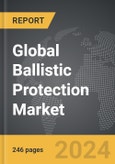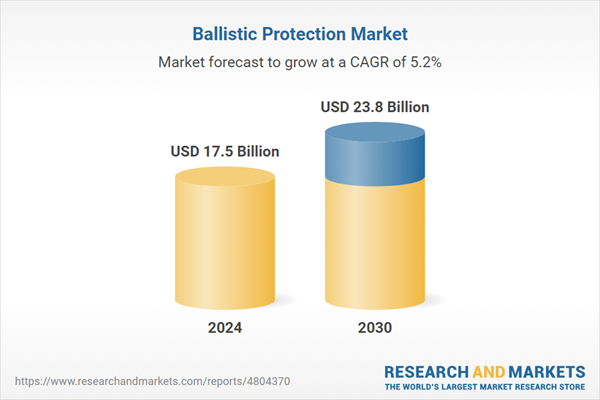Global Ballistic Protection Market - Key Trends and Drivers Summarized
Why Is Ballistic Protection Critical in Modern Defense and Security?
Ballistic protection refers to the range of materials and technologies used to shield individuals and assets from the impact of bullets, shrapnel, and other projectiles. This protection is critical in military, law enforcement, and civilian contexts where the risk of gunfire or explosive threats is present. Ballistic protection encompasses various products, including body armor, helmets, ballistic shields, and vehicle armor, all designed to absorb and dissipate the kinetic energy of incoming projectiles, thereby reducing or preventing injury. The effectiveness of ballistic protection is measured by its ability to stop specific calibers of bullets or fragments, with different levels of protection available depending on the threat level. As threats evolve, the importance of reliable and advanced ballistic protection continues to grow, making it a fundamental component of personal and national security strategies.How Are Technological Innovations Enhancing Ballistic Protection?
Technological innovations are significantly enhancing the effectiveness and usability of ballistic protection, making it lighter, stronger, and more versatile. Advances in materials science have led to the development of high-performance fibers like Kevlar, Twaron, and Dyneema, which offer excellent protection while being much lighter than traditional materials like steel. These materials are now commonly used in body armor and helmets, providing military and law enforcement personnel with greater mobility and comfort. Additionally, the integration of ceramics with composite materials has resulted in advanced hard armor plates that can stop high-caliber rounds while maintaining a relatively low weight. Innovations in nanotechnology and smart materials are also being explored, with the potential to create armor that can self-repair or adapt to different levels of threat. These technological advancements are driving the adoption of more sophisticated ballistic protection solutions, ensuring that personnel and assets are better protected in increasingly dangerous environments.Why Is There an Increasing Demand for Ballistic Protection in Civilian Markets?
The demand for ballistic protection is extending beyond military and law enforcement to civilian markets, driven by rising concerns over personal safety and the need for protection in high-risk environments. The increase in active shooter incidents, political unrest, and terrorism has led to a growing market for civilian ballistic protection products, such as bulletproof backpacks, vests, and personal shields. Moreover, the construction industry is increasingly incorporating ballistic protection into the design of critical infrastructure, including government buildings, airports, and schools, to safeguard against potential attacks. The development of discreet and lightweight protection options that can be worn or carried in everyday life is also contributing to the growth of the civilian market. As the perception of risk increases, so too does the demand for accessible and effective ballistic protection solutions in civilian contexts.What Is Driving Growth in the Ballistic Protection Market?
The growth in the ballistic protection market is driven by several factors, including the ongoing advancements in materials technology that are making protective gear lighter, stronger, and more comfortable for users. The increasing need for protection in both military and civilian contexts, fueled by global conflicts, rising crime rates, and the threat of terrorism, is also propelling demand. The expansion of ballistic protection into new applications, such as infrastructure security and personal safety products for civilians, is creating additional market opportunities. Moreover, the growing investment in defense and law enforcement by governments around the world is driving the adoption of advanced ballistic protection systems. As these factors converge, the ballistic protection market is expected to experience sustained growth, with ongoing innovation ensuring that protection solutions keep pace with emerging threats.Report Scope
The report analyzes the Ballistic Protection market, presented in terms of market value (USD). The analysis covers the key segments and geographic regions outlined below.- Segments: Segment (Personal Protective Equipment (PPE), Vehicle Armor); End-Use (Defense, Homeland Security).
- Geographic Regions/Countries: World; United States; Canada; Japan; China; Europe (France; Germany; Italy; United Kingdom; Spain; Russia; and Rest of Europe); Asia-Pacific (Australia; India; South Korea; and Rest of Asia-Pacific); Latin America (Argentina; Brazil; Mexico; and Rest of Latin America); Middle East (Iran; Israel; Saudi Arabia; United Arab Emirates; and Rest of Middle East); and Africa.
Key Insights:
- Market Growth: Understand the significant growth trajectory of the Personal Protective Equipment (PPE) segment, which is expected to reach US$21.1 Billion by 2030 with a CAGR of 5.5%. The Vehicle Armor segment is also set to grow at 3.2% CAGR over the analysis period.
- Regional Analysis: Gain insights into the U.S. market, valued at $4.6 Billion in 2024, and China, forecasted to grow at an impressive 7.8% CAGR to reach $5.3 Billion by 2030. Discover growth trends in other key regions, including Japan, Canada, Germany, and the Asia-Pacific.
Why You Should Buy This Report:
- Detailed Market Analysis: Access a thorough analysis of the Global Ballistic Protection Market, covering all major geographic regions and market segments.
- Competitive Insights: Get an overview of the competitive landscape, including the market presence of major players across different geographies.
- Future Trends and Drivers: Understand the key trends and drivers shaping the future of the Global Ballistic Protection Market.
- Actionable Insights: Benefit from actionable insights that can help you identify new revenue opportunities and make strategic business decisions.
Key Questions Answered:
- How is the Global Ballistic Protection Market expected to evolve by 2030?
- What are the main drivers and restraints affecting the market?
- Which market segments will grow the most over the forecast period?
- How will market shares for different regions and segments change by 2030?
- Who are the leading players in the market, and what are their prospects?
Report Features:
- Comprehensive Market Data: Independent analysis of annual sales and market forecasts in US$ Million from 2024 to 2030.
- In-Depth Regional Analysis: Detailed insights into key markets, including the U.S., China, Japan, Canada, Europe, Asia-Pacific, Latin America, Middle East, and Africa.
- Company Profiles: Coverage of players such as Advanced Technology Compliant Solutions, ArmorSource LLC, ArmorWorks Enterprises, LLC, Australian Defence Apparel (ADA), Avon Protection Plc and more.
- Complimentary Updates: Receive free report updates for one year to keep you informed of the latest market developments.
Some of the 46 companies featured in this Ballistic Protection market report include:
- Advanced Technology Compliant Solutions
- ArmorSource LLC
- ArmorWorks Enterprises, LLC
- Australian Defence Apparel (ADA)
- Avon Protection Plc
- BAE Systems Plc
- Beijing Yingtelai Technology Co., Ltd.
- Best Chemical Co. (S) Pte., Ltd.
- Best Workwear
- Bullard
This edition integrates the latest global trade and economic shifts into comprehensive market analysis. Key updates include:
- Tariff and Trade Impact: Insights into global tariff negotiations across 180+ countries, with analysis of supply chain turbulence, sourcing disruptions, and geographic realignment. Special focus on 2025 as a pivotal year for trade tensions, including updated perspectives on the Trump-era tariffs.
- Adjusted Forecasts and Analytics: Revised global and regional market forecasts through 2030, incorporating tariff effects, economic uncertainty, and structural changes in globalization. Includes historical analysis from 2015 to 2023.
- Strategic Market Dynamics: Evaluation of revised market prospects, regional outlooks, and key economic indicators such as population and urbanization trends.
- Innovation & Technology Trends: Latest developments in product and process innovation, emerging technologies, and key industry drivers shaping the competitive landscape.
- Competitive Intelligence: Updated global market share estimates for 2025, competitive positioning of major players (Strong/Active/Niche/Trivial), and refined focus on leading global brands and core players.
- Expert Insight & Commentary: Strategic analysis from economists, trade experts, and domain specialists to contextualize market shifts and identify emerging opportunities.
Table of Contents
Companies Mentioned (Partial List)
A selection of companies mentioned in this report includes, but is not limited to:
- Advanced Technology Compliant Solutions
- ArmorSource LLC
- ArmorWorks Enterprises, LLC
- Australian Defence Apparel (ADA)
- Avon Protection Plc
- BAE Systems Plc
- Beijing Yingtelai Technology Co., Ltd.
- Best Chemical Co. (S) Pte., Ltd.
- Best Workwear
- Bullard
Table Information
| Report Attribute | Details |
|---|---|
| No. of Pages | 246 |
| Published | February 2026 |
| Forecast Period | 2024 - 2030 |
| Estimated Market Value ( USD | $ 17.5 Billion |
| Forecasted Market Value ( USD | $ 23.8 Billion |
| Compound Annual Growth Rate | 5.2% |
| Regions Covered | Global |









